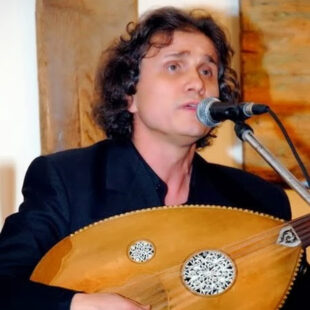00:00
Home / Her Work / Song Catalogue / No Father Had I
No father had I, my mother was a widow.
My mother was a widow and sold me,
sold me into service to a good master.
My master was joyful, his son was to wed,
and bade me serve his guests from a golden jug.
With all the pouring, the singing and the dancing,
my arms grew weak and the jug slipped from my grasp.
It hit no stone, no cobble,
but smashed into smithereens in my lady’s lap.
They locked me up for five long months,
mislaid the keys for five long years.
I planted a hazel at my prison door
and tasted of its fruit, though not of freedom.
Translated by Michael Eleftheriou
Εγώ είμαι ο- εγώ είμαι ορφανό πιδί,
είχα και χήρα μάνα, είχα και χήρα μάνα,
και η μάνα μου, και η μάνα μου μι στοίχησι1
σ’ έναν καλό αφέντη, σ’ έναν καλό αφέντη.
Κι αφέντης μου είχι χαρά, παντρεύει τουν υγιό του
και μ’ έβαλαν για να κιρνώ μ’ ένα χρυσό ποτήρι.
’Πού του πουλύ του κέρασμα, ’πού του πουλύ του γλέντι,
συντρόμαξαν2 τα χέρια μου κι ίπεσι του ποτήρι.
Ούτι σι πέτρα χτύπησι, ούτι σι καλντιρίμι,
μες στης κυράς μου την πουδιά χίλια κουμμάτια γίν’κι.
Μι βάλανι στη φυλακή να κάμου πέντι μήνις
κι παραπέσαν τα κλειδιά κι κάμου πέντι χρόνια.
Λεφτοκαρυά εφύτεψα στης φυλακής την πόρτα,
λεφτοκαράκια έφαγα μα λεφτεριά δεν είδγια.
1μι στοίχησι: με μίσθωσε στην υπηρεσία
2συντρόμαξαν: τρεμούλιασαν
One of the fundamental features of a fable is the critique it conveys through the narration of myths and the values the tale embodies. This song belongs to one of the oldest types of imprisonment songs. At its heart lies a criticism of justice — not as a moral stance adopted by an individual, but as an institution. Here, a child, to whom fate has already been far from kind and who has been sold into the service of a wealthy master by his widowed mother, is condemned for a trifle (“my arms grew weak and the jug slipped from my grasp”) and ends up imprisoned for life due to the inefficiency, indifference, or weakness of the system (“mislaid the keys for five long years”). The motif of the hazel (in Greek, the word for hazel is leftokarya, which symbolically echoes freedom, lefteria), which germinates when he enters the jail and whose fruit he eventually eats, underscores the disproportionate length of his incarceration and the sense of unbearable injustice that can only be conveyed in song. The song’s power to bring deliverance is revealed in variants in which a princess hears him, is moved, and orders the release of the prisoner everyone else has forgotten.
Miranda Terzopoulou (2008)
Studio recording (2006). Based on Yiorgos Amarantidis’ 1970s field recording of the song from Traïani and Thodoros Pitsanis, a married couple, made during their stay in Athens for appearances at the Dora Stratou Theatre. Residents of the village of Kitros in Pieria, Traïani and Thodoros were refugees from Bana, Eastern Roumelia. Amarantidis later handed the tape with the collected songs to Domna Samiou for inclusion in her archive.

Singers

Constantinopolitan lyra

Constantinopolitan lute

Goblet drum

Informant (source of the song)